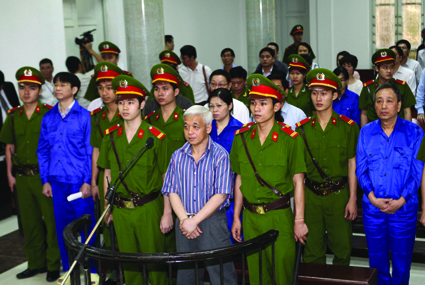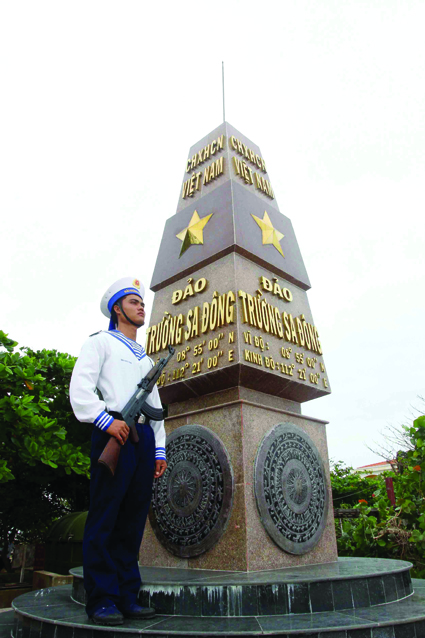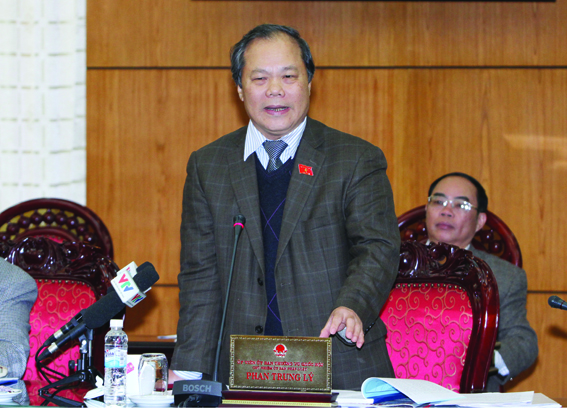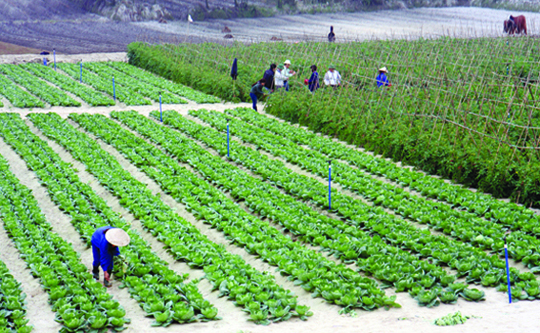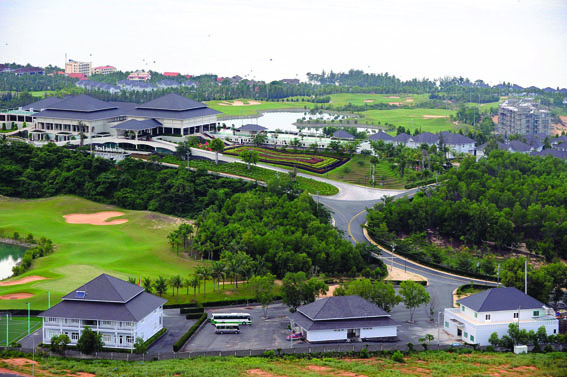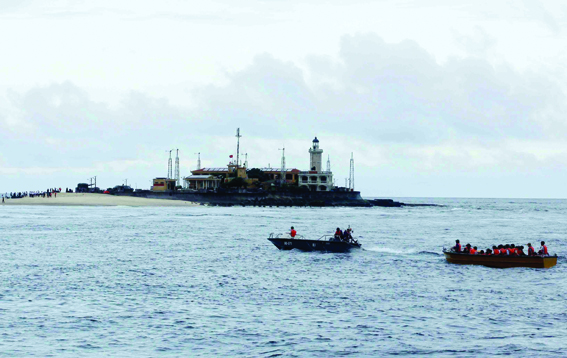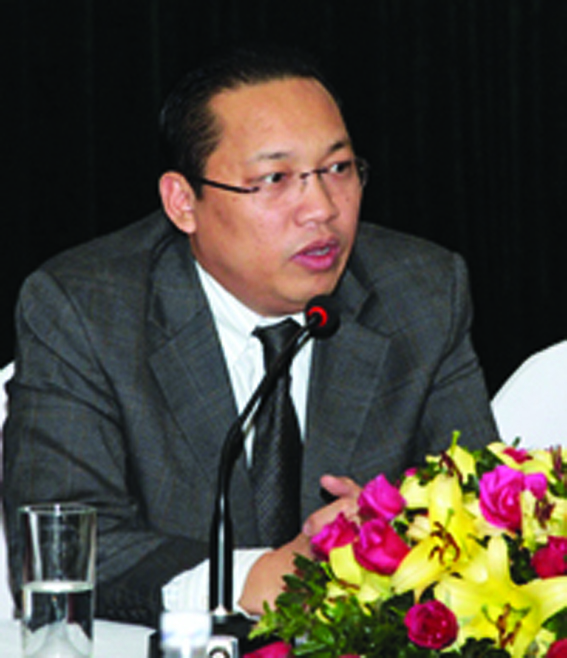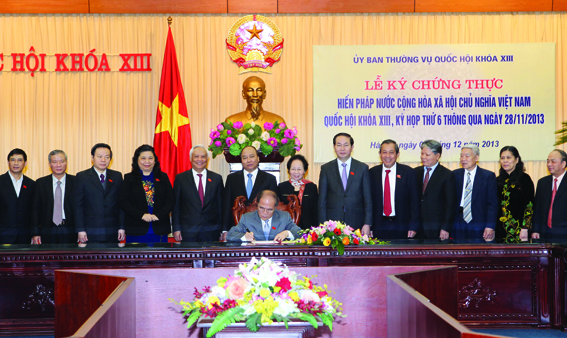Ngo Duc Manh, LL.D
Vice Chairman
National Assembly External Relations Committee
International integration and the requirements to revise the 1992 Constitution with regard to foreign policy
The revision of the 1992 Constitution aims to meet the requirements of Vietnam’s accelerated international integration. This is clearly stated by the 1992 Constitution Revision Drafting Committee in its report that after 20 years of implementation of the 1992 Constitution, Vietnam has witnessed many changes in the international context of great, profound and complicated developments. “Hence, the 1992 Constitution needs to be revised to ensure the comprehensive renewal, both economic and political..., to build and defend the country; to take initiative in international integration.”[1]
Though the world and regional situation has recently witnessed many complicated developments, the trend of peace, stability and cooperation for joint development still prevails the international relations. A multi-polar world appears clearer and clearer; the trend of democratization in international relations continues to develop though being still governed by big countries. The scientific and technological revolution, the knowledge-based economy and the process of globalization have strongly developed and exerted deep impacts on the development of many countries. Globalization has become an objective phenomenon and a big trend of the modern world, bringing about both opportunities and challenges. It is the globalization that has posed countries, rich or poor, big or small, to the need for international integration in order to take advantage of opportunities for development.

Ilham Aliyev on a state visit to Vietnam__Photo: Tri Dung/VNA
In addition, after nearly 30 years of “doi moi” (renewal), Vietnam’s posture and strength have been constantly consolidated and enhanced. We have firmly maintained the environment of peace and stability, creating favorable conditions for national construction and defense. Thanks to “doi moi”, the country has got out of socio-economic crisis and necessary prerequisites have been created for the shift to a new period of development - the period of accelerated industrialization and modernization. The 2006-2010 five-year plan concluded with important achievements such as the macro-economy was stabilized and the 2010 GDP doubled that of 2000. Vietnam has lifted itself from the state of underdevelopment with its economic structure continuing to develop toward industrialization and modernization. The institutions of the market economy and ruled-by-law socialist state have been further improved, among others.
In such circumstance, Vietnam has become an active and responsible member of the international community. Its multilateral and bilateral ties have been consolidated and developed extensively and intensively. We have established the relationship of strategic partnership or comprehensive partnership with many countries, including all five permanent members of the United Nations Security Council, thus creating a new qualitative development in Vietnam’s external activities.
Vietnam has actually brought into play its role with extensive and intensive involvement in the process of regional and world alignment. Being a member of the Association of Southeast Asian Nations (ASEAN) since 1995, Vietnam has actively participated in the process of building the ASEAN Community, as well as in various organizations and forums such as the Asean Regional Forum (ARF), Asia-Pacific Economic Cooperation (APEC) and East Asia Summit (EAS). Vietnam has also participated in eight bilateral and regional free trade agreements and negotiated six others, including the Trans-Pacific Partnership (TPP) and Regional Comprehensive Economic Partnership (RCEP).
Yet, noteworthy is that Vietnam has been, for the first time, elected to such important multilateral institutions as the United Nations Security Council in the capacity as non-permanent member, the World Heritage Committee of UNESCO, and the United Nations Human Rights Council (for the 2014-2016 term). Vietnamese representatives have held important positions in a number of multilateral organizations such as Secretary General of ASEAN and member of the Board of Governors of the International Atomic Energy Agency (IAEA).
Based on the objective assessment of the domestic, regional and world situations and on practical experience in external activities, the XIth National Congress of the Communist Party of Vietnam (CPV) mapped out the foreign policy in the new situation:
“To implement consistently a foreign policy of independence, self-reliance, peace, cooperation and development; to multilateralize and diversify relations, be proactive and active in international integration; to be a friend and reliable partner and a responsible member of the international community; to work for the interest of the country and the nation, for a prosperous and strong socialist Vietnam. The tasks of foreign relation work are to maintain a peaceful environment and create favorable conditions for stepping up industrialization and modernization, firmly defending independence, sovereignty, unity and territorial integrity; to raise the country’s status; to contribute actively to the struggle for peace, national independence, democracy and social progress in the world.”[2]
At the same time, the Party also pointed out:
“To join bilateral and multilateral political and security cooperation mechanisms for the national interests on the basis of respect for the basic principles of international law and the United Nations Charter”.
It can be realized that the foreign policy charted out by the XIth National Congress of the Party with basic viewpoints and orientations of strategic significance for the entire period of transition to socialism should be constitutionalized for implementation.
Hence, the 1992 Constitution’s Article 14 on foreign policy needs to be amended and supplemented with a view to creating political and legal bases for Vietnam’s extensive and intensive international integration. This is also clearly pointed out by National Assembly Chairman Nguyen Sinh Hung at a national conference for public comments on the draft revision of the 1992 Constitution: “Through 20 years of implementing the 1992 Constitution with many great achievements of historic significance, we now need to further revise the Constitution to suit the new national situation in the international context of many profound changes.”[3]
Basic foreign policy contents in the new Constitution
Vietnam’s foreign policy is outlined in Article 12 of the 2013 Constitution as follows: “The Socialist Republic of Vietnam shall consistently implement its foreign policy of independence, self-reliance, peace, friendship, cooperation and development; multilateralization and diversification of external relations, proactive and active international integration and cooperation, on the basis of respect for each other’s independence, sovereignty and territorial integrity, non-interference in each other’s internal affairs, equality and mutual benefit; abide by the Charter of the United Nations and treaties to which the Socialist Republic of Vietnam is a contracting party; act as a friend, reliable partner and responsible member of the international community for the sake of national interests, and contribute to the cause of peace, national independence, democracy and social progress in the world.”
The 2013 Constitution’s provisions on foreign policy have perpetuated those of the previous constitutions, particularly the 1992 Constitution, and developed with many new connotations clearly manifested through the following principal contents:
First, Article 12 of the 2013 Constitution carries on the basic principles defined in the 1992 Constitution in Vietnam’s foreign policy, further reiterating: “The Socialist Republic of Vietnam shall consistently implement its foreign policy of independence, self- reliance, peace, friendship, cooperation and development.” This is the perpetuation and development of the foreign policy guiding principle of “more friends and fewer enemies”, which Vietnam has persistently pursued, as clearly seen in President Ho Chi Minh’s December 1946 appeal to the United Nations that “for democratic countries, the Democratic Republic of Vietnam adopts the policy of open door and cooperation in all fields”.

Summit in Nay Pyi Taw (Myanmar)__Photo: Duc Tam/VNA
With a new thinking of the time, we declared “Vietnam wishes to be friend” at the VIIth National Party Congress; “is ready to befriend” at the VIIIth National Party Congress; “to be a friend and a reliable partner” at the IXth National Party Congress; then “is a responsible member of the international community” at the XIth National Party Congress. This not only reflects the maturity of Vietnam’s diplomacy but also expresses the new status and strengths of the country in the international arena after nearly 30 years of renewal.
Yet, the basic difference in prescribing Vietnam’s foreign policy between the 1992 Constitution and the new Constitution is that the former specifies the groups of “socialist countries and neighboring countries”, with which Vietnam enhances the solidarity, friendship and cooperation, while the latter generally prescribes a foreign policy of “peace, friendship, cooperation and development” and “multilateralization and diversification of relations.” Together with this new foreign policy guideline, Vietnam also affirms “to be a friend and a reliable partner...,” revealing that Vietnam implements an open foreign policy with all countries and nations in the world community.
Second, Article 12 of the 2013 Constitution adds the phrase “independence, self-reliance” to Vietnam’s foreign policy. Independence and self-reliance are the goal as well as the fruits of our forefathers’ struggle for national construction and defense and also the guidelines of Vietnam’s foreign policy. With its foreign policy of independence, self-reliance, peace, friendship, cooperation and development and “non-interference in each other’s internal affairs, equality and mutual benefit”, Vietnam’s position and prestige have been constantly enhanced in the international arena. It can be said that we have never before had many friends and partners as at present.
Third, the 2013 Constitution clearly states the guiding principle of Vietnam’s foreign policy, which is new in “proactive and active international integration and cooperation” and “a responsible member”. It is truly an important guideline shift from “proactive and active international economic integration while expanding international cooperation in other fields”, which was adopted by the Xth National Party Congress, to “proactive and active international cooperation” as charted out by the XIth National Party Congress. With this guideline, international integration is no longer limited to the economic field but expands to other fields, political, national defense, security, social and cultural, thus bringing to Vietnam many opportunities for development but also not a few difficulties and challenges.
Fourth, the Constitution prescribes, for the first time, the foreign-policy objective, that is “for the sake of national interests”. This is of important significance as affirming the national interests as the foreign-policy objective also means that the national interests must be ranked as the supreme principle of foreign-policy activities, and that ensuring the national interests is a principle which must be followed by all external-relation activities, from the state diplomacy to the Party’s external-relation activities as well as the people’s diplomacy.
Fifth, the Constitution further articulates, for the first time, in Article 12 that Vietnam shall “abide by the Charter of the United Nations and treaties to which the Socialist Republic of Vietnam is a contracting party”. This new provision is of extremely important significance, showing Vietnam’s commitment to be “an active and responsible member” of the United Nations. Abiding by the Charter of the United Nations and treaties is also a legitimate demand and legal basis, acknowledged by international community, for building peace, preventing conflicts, and resolving differences and disputes through peaceful negotiations, neither using, nor threatening to use, force, which Vietnam has persistently pursued and demanded other countries to do the same.
Along with new provisions on foreign policy in Article 12, the 2013 Constitution contains new supplements on the mission of the people’s armed forces, which shall perform “the international duties” (Article 65), besides the tasks of protecting “the independence, sovereignty, unity and territorial integrity of the Fatherland” as prescribed by the 1992 Constitution. This new provision creates a legal ground for issuing specific regulations on Vietnam’s participation in peace missions sponsored by the United Nations.-
[1] Report No. 194/TTr-UBDTSDHP of October 19, 2012, on the draft revision of the 1992 Constitution.
[2] Documents of the XIth National Congress of the Communist Party of Vietnam, Hanoi, the National Political Publishing House
[3] National Assembly Chairman Nguyen Sinh Hung’s address at a national conference on public comments on the draft revision of the 1992 Constitution.

